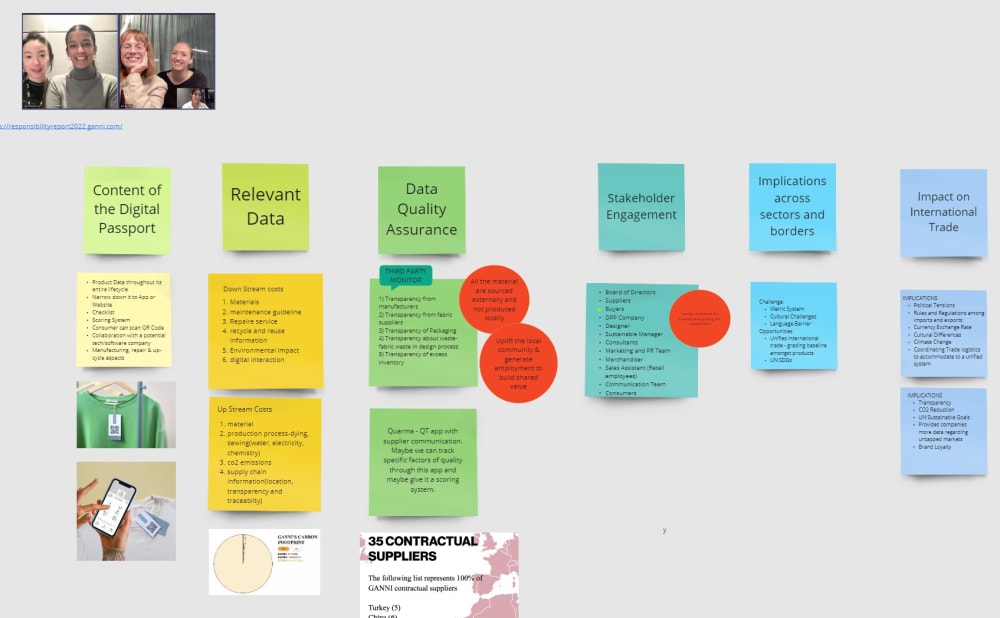
LCF and Copenhagen School of Design Technology students explore Digital Product Passports and their impact on future fashion markets

- Written byJess Ashworth
- Published date 25 March 2024

In February, students from London College of Fashion, UAL and KEA (Copenhagen School of Design and Technology) held a joint online workshop hosted by Jeanne Langford, Course Leader in MA Fashion Design Management at LCF and Jespser Thisted, Senior Lecturer in Design and Business at KEA. The universities came together to share ideas and build connections as well as exploring the European Union (EU) plans to introduce digital product passports and the impact this will have on the future of fashion markets.
Jesper set the scene, outlining the EU Green Deal which is encouraging people and industries to work in a more environmentally friendly and conscious way. The Deal includes numerous initiatives, including regulations about digital product passports. The EU has recently introduced a groundbreaking initiative known as the Digital Product Passport (DPP) as a part of its textile strategy. This initiative aims to revolutionise the fashion industry by creating a digital product ID throughout their lifecycle. DPPs will be either a QR code, a tag, or some other kind of marking built into the clothes. DPPs will include product specific rules, transparency of the supply chain and sustainability information. The information will be easy to understand for the consumer.

Jesper and Jeanne next introduced their industry speakers; Christoffer Immanuel, Founder of Organic Basics and the new platform Sustie; and Mehdi Doghri, Co-founder of Save Your Wardrobe.
Christoffer led the students through Sustie’s plans to grow using DPP initiatives, stating their mission to make climate action a revenue driver for the fashion industry. DPPs are being introduced to improve consumer transparency but for now they will sit in European centric data bases that will drive industry rather than consumer focus.
Mehdi then spoke to Save Your Wardrobe which tackles industry wide problems with after sales service offerings. Mehdi described how behind the fashion industry is compared with the tech world in terms of customer service which offers warranties, life-long assurances, and easily available information on repair services. This level of support is rare in the fashion world; customers would usually have to find their own tailor or learn to fix their zips themselves. Using the information provided via DPPs, aftercare can be tracked and provide a platform to book services.

Jeanne and Jesper introduced the students to their brief and challenge for the day: to analyse and propose solutions for key aspects of the DPP in the context of the fashion industry. They were to explore and feedback on:
- Content of the Digital Product Passport
- Impact on International Trade
- Implications Across Sectors and Borders
- Relevant Data
- Data Quality Assurance
- Stakeholder Engagement
Over a two-hour workshop, the students investigated different companies including Stien Goya, Urban Outfitters, and Stella McCartney to see how they are meeting sustainability goals and how to help them adjust to DPP criteria. Students also used this opportunity to chat and learn more about one another, making valuable connections.

In the final presentations, students’ suggestions included more visibility on after care services for clothes and within their supply chain. The group investigating Stine Goya found that only about 20% of the fabric in their knits was wool; they also discovered that their sourcing process was essentially invisible to customers. Groups that investigated British based companies – such as Victoria Beckham – discussed how the UK also needs to adjust to DPPs in the future; even if operations are not based within the EU materials and shipments will often move through the EU. Students stressed the need for greater supplier relations for these companies and the importance of supplier manuals. Social media was highlighted as an important area for companies to captitalise on making the sustainability and environmental aims and achievements of businesses a selling feature – offering a focus on an area other companies are not.

Reflecting on the event, Jesper stated that the “event not only highlighted the importance of digital innovation in fashion but also underscored the value of international cooperation in education. Our students gained unparalleled experience, working across borders to solve real-world problems, preparing them for a future where technology and sustainability are at the forefront of the fashion industry.”
- Read more LCF Stories
- Read more about LCF Global